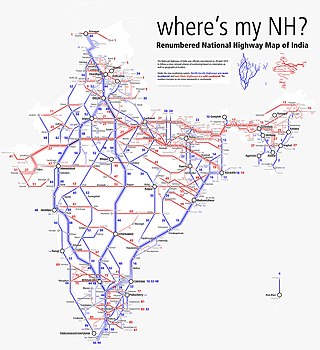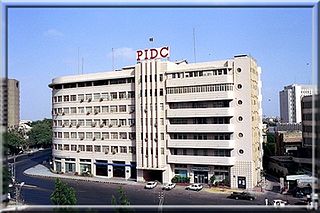
The Asian Development Bank (ADB) is a regional development bank established on 19 December 1966, which is headquartered in 6 ADB Avenue, Mandaluyong, Metro Manila 1550, Philippines. The bank also maintains 31 field offices around the world to promote social and economic development in Asia. The bank admits the members of the UN Economic and Social Commission for Asia and the Pacific, and non-regional developed countries. Starting with 31 members at its establishment, ADB now has 68 members.

The economy of Kazakhstan is the largest in Central Asia in both absolute and per capita terms. In 2021, Kazakhstan attracted more than US$370 billion of foreign investments since becoming an independent republic after the dissolution of the former Soviet Union.

The economy of Pakistan is categorized as a developing economy. It ranks as the 24th-largest based on GDP using purchasing power parity (PPP) and the 46th largest in terms of nominal GDP. With a population of 241.5 million people as of 2023, Pakistan's position at per capita income ranks 161st by GDP (nominal) and 138th by GDP (PPP) according to the International Monetary Fund (IMF).

The mayor of London is the chief executive of the Greater London Authority. The role was created in 2000 after the Greater London devolution referendum in 1998, and was the first directly elected mayor in the United Kingdom.

Islamabad is the capital city of the Islamic Republic of Pakistan. It is the country's ninth-most populous city with a population of over 1.2 million people and is federally administered by the Pakistani government as part of the Islamabad Capital Territory. Built as a planned city in the 1960s and established in 1967, it replaced Karachi as Pakistan's national capital.

A public–private partnership is a long-term arrangement between a government and private sector institutions. Typically, it involves private capital financing government projects and services up-front, and then drawing revenues from taxpayers and/or users for profit over the course of the PPP contract. Public–private partnerships have been implemented in multiple countries and are primarily used for infrastructure projects. Although they are not compulsory, PPPs have been employed for building, equipping, operating and maintaining schools, hospitals, transport systems, and water and sewerage systems.

The national highways in India are a network of limited access roads owned by the Ministry of Road Transport and Highways. National highways have flyover access or some controlled-access, where entrance and exit is through the side of the flyover. At each highway intersection, flyovers are provided to bypass the traffic on the city, town, or village. These highways are designed for speeds of 100 km/h. Some national highways have interchanges in between, but do not have total controlled-access throughout the highways. The highways are constructed and managed by the Central Public Works Department (CPWD), the National Highways and Infrastructure Development Corporation Limited (NHIDCL), and the public works departments (PWD) of state governments. Currently, the longest national highway in India is National Highway 44 at 4,112 km. India started four laning of major national highways with the National Highway Development Project (NHDP). As of March 2022 India has approximately 35,000 km of four laned National highways.

A major non-NATO ally (MNNA) is a designation given by the United States government to countries that have strategic working relationships with the U.S. Armed Forces while not being members of the North Atlantic Treaty Organization (NATO). While the status does not automatically constitute a mutual defense pact with the United States, it does confer a variety of military and financial advantages that are otherwise unobtainable by non-NATO countries. There are currently 20 major non-NATO allies across four continents: 11 in Asia, 4 in Africa, 3 in South America, and 2 in Oceania.

Pakistan Industrial Development Corporation (PIDC) is a state corporation of Pakistan working under Ministry of Industries and Production.
Government procurement or public procurement is undertaken by the public authorities of the European Union (EU) and its member states in order to award contracts for public works and for the purchase of goods and services in accordance with principles derived from the Treaties of the European Union. Such procurement represents 13.6% of EU GDP as of March 2023, and has been the subject of increasing European regulation since the 1970s because of its importance to the European single market.
Government procurement or public procurement is when a governing body purchases goods, works, and services from an organization for themselves or the taxpayers. In 2019, public procurement accounted for approximately 12% of GDP in OECD countries. In 2021 the World Bank Group estimated that public procurement made up about 15% of global GDP. Therefore, government procurement accounts for a substantial part of the global economy.

Fatima Jinnah Park, also known as Capital Park or F-9 Park, is a public recreational park that spans the whole of Sector F-9 of Islamabad, Pakistan. It is named after Mādar-e Millat Fatima Jinnah, the younger sister of the founder of Pakistan Muhammad Ali Jinnah.
Electricity in Pakistan is generated, transmitted and distributed by two vertically integrated public sector companies, first one being Water and Power Development Authority (WAPDA) responsible for the production of hydroelectricity and its supply to the consumers by electricity distribution companies (DISCOS) under the Pakistan Electric Power Company (PEPCO) being the other integrated company. Currently, there are 12 distribution companies and a National Transmission And Dispatch Company (NTDC) which are all in the public sector except Karachi Electric in the city of Karachi and its surrounding areas. There are around 42 independent power producers (IPPs) that contribute significantly in electricity generation in Pakistan.

Anusha Rahman Ahmad Khan is a Pakistani politician who served as Federal Minister for Information Technology and Telecommunication, in the Abbasi cabinet from April to May 2018. Previously she served as the Minister of State for Information Technology and Telecommunication of Pakistan from June 2013 to July 2017 in the third Sharif ministry and again from August 2017 to April 2018 in the Abbasi ministry. She had been a member of the National Assembly of Pakistan from 2008 to May 2018 representing the Pakistan Muslim League (N). In the 2024 Pakistani Senate election, Anusha emerged victorious in the senate seats reserved for women.

The M-6 Motorway, or the Sukkur–Hyderabad Motorway, is an under-construction motorway project in Pakistan. It will connect Sukkur to Hyderabad. The 306 km long M-6 motorway is the only missing vital link of North to South connectivity, i.e. from Karachi to Peshawar. The motorway will cost approximately $1.7 billion to build. The M-6 will be a six-lane motorway with a design speed of 120 km/hour, 89 bridges, 15 interchanges and 243 underpasses.
Information Technology in Sri Lanka refers to business process outsourcing, knowledge process outsourcing, software development, IT Services, and IT education in Sri Lanka. Sri Lanka is always ranked among the top 50 outsourcing destinations by AT Kearney, and Colombo and ranked among "Top 20 Emerging Cities" by Global Services Magazine. The export revenue of this industry grew from USD 213 million in 2007 to USD 1.2 billion in 2021.

Saudi Vision 2030 is a government program launched by the Kingdom of Saudi Arabia which aims to achieve the goal of increased diversification economically, socially and culturally, in line with the vision of Saudi Crown Prince and Prime Minister Mohammed bin Salman. It was first announced on 25 April 2016 by the Saudi government.
The Canada Infrastructure Bank (French: Banque de l'infrastructure du Canada) (CIB) is a federal Crown Corporation of Canada tasked with financially supporting revenue-generating infrastructure projects that are "in the public interest" by catalyzing private investment through methods such as direct investment and public-private partnerships.

Regional economy in Wales is centred on four regional economic boards in Wales. Each board oversees a city or growth deal, signed between 2016 and 2022, lasting 10–15 years. Two of the deals are city deals signed and proposed by their respective economic boards, and their areas are described as "city regions"; the Cardiff Capital Region and Swansea Bay City Region. Whereas in North Wales, the North Wales Economic Ambition Board negotiated a North Wales growth deal signed in 2020, and in Mid Wales, the Growing Mid Wales Partnership, led negotiations for a Mid Wales growth deal signed in 2022. The programmes are based on the City deal and Growth deal initiatives set up by the Coalition UK Government in 2012, to promote the decentralisation of the UK economy, by stimulating local economic growth.














